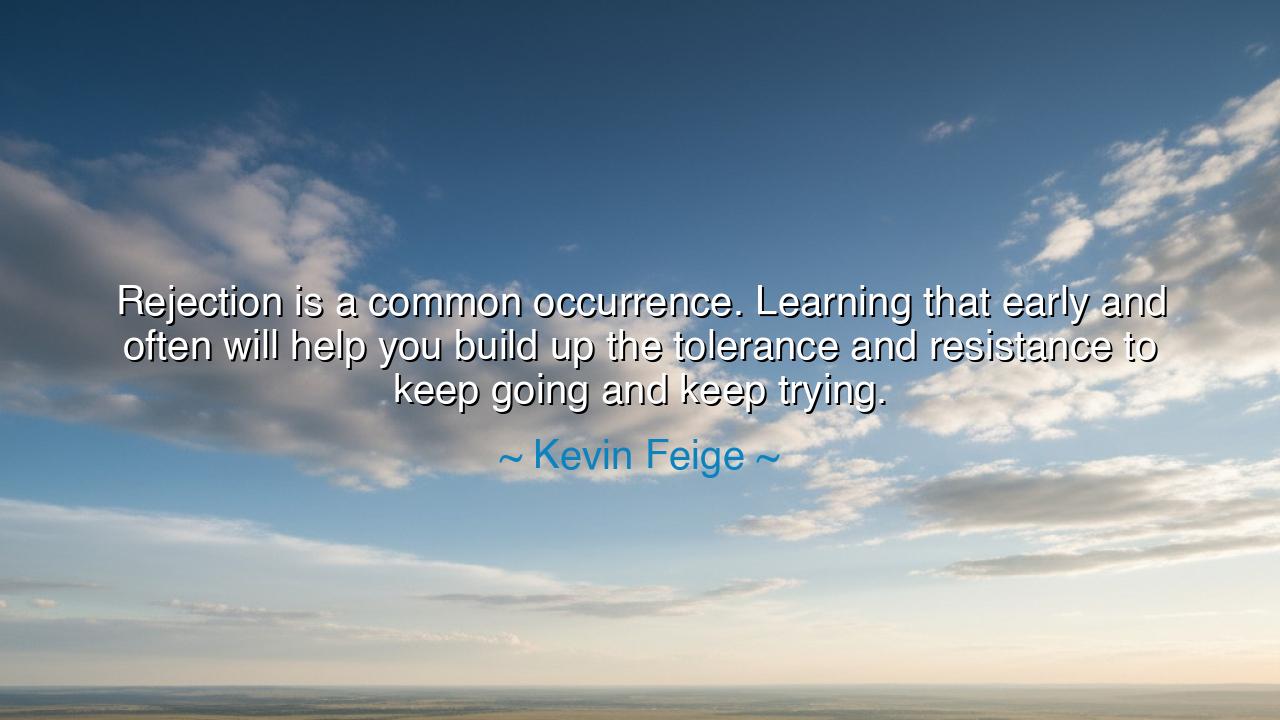
Rejection is a common occurrence. Learning that early and often
Rejection is a common occurrence. Learning that early and often will help you build up the tolerance and resistance to keep going and keep trying.






“Rejection is a common occurrence. Learning that early and often will help you build up the tolerance and resistance to keep going and keep trying,” spoke Kevin Feige, the master architect behind the grand tapestry of the Marvel Cinematic Universe. Beneath these pragmatic words lies a truth as old as ambition itself — that rejection, though bitter to the taste, is the food of growth; that the soul is not strengthened by ease, but by refusal and defeat. Feige, like many before him, reminds us that the road to mastery is paved not with applause, but with setbacks, and that those who endure rejection with courage and humility forge within themselves a strength no success can teach.
In the world of creation, where vision must battle doubt, rejection is not a curse — it is the fire through which iron becomes steel. Feige himself rose through years of trial and dismissal, often facing disbelief in his ideas before his vision for interconnected storytelling changed the very face of cinema. His words are not theory, but testimony. He speaks as one who has learned that every “no” is a teacher, every closed door a forge, every failure a whisper urging the heart to persevere. To learn rejection early, he says, is to learn resilience — for the soul that has met defeat and still stands cannot easily be shaken again.
The ancients, too, revered this truth. Epictetus, the Stoic philosopher who began his life as a slave, taught that no man becomes strong without the testing of hardship. “Difficulties,” he said, “show what men are.” What Feige calls tolerance and resistance, the Stoics called virtue — the steadfastness that transforms pain into progress. To meet rejection not with despair but with discipline is to discover a rare form of power: the ability to keep going when the world turns its face away. For even the gods, said the old poets, favor not the untested, but the tried — not the unbroken, but the unbowed.
Consider the story of J.K. Rowling, who, before she became one of the world’s most beloved authors, was rejected by twelve publishers. Each letter of refusal could have been her end; instead, it became her foundation. Like Feige, she learned the art of perseverance through rejection, and her creation, Harry Potter, would eventually reach every corner of the world. Yet she has said that those rejections were among her most precious teachers, for they taught her that worth is not given — it is proven. Her story, like Feige’s message, reminds us that those who fear rejection will never create anything that lasts, for endurance is the cost of greatness.
In Feige’s words, there is also humility. He does not say one must love rejection — only that one must learn from it. The wise do not deny pain; they transform it. The artist, the entrepreneur, the student, the dreamer — all must confront rejection as a mirror reflecting their current strength. Some will see it and retreat; others will see it and refine themselves. The difference between those who fail forever and those who rise lies not in talent, but in resilience — the patient, almost sacred willingness to try again.
To build tolerance for rejection, one must first release the illusion that success is owed. The ancients called this acceptance of fate — amor fati, the love of what happens. It is to greet rejection not as an enemy, but as a companion on the path. Each time you are refused, each time you stumble, you are being prepared — tempered like a blade — for the day your effort meets opportunity. The one who cannot bear rejection remains fragile, but the one who welcomes it becomes indestructible.
Thus, take this lesson to heart, O seeker of purpose: let rejection not silence you, but strengthen you. Expect it, meet it, and rise above it. Every “no” you face adds a layer to your armor, a depth to your understanding. Every failure survived becomes a stone beneath your feet, lifting you higher toward the summit. When others stop, you will still be standing — not because you have avoided rejection, but because you have mastered it.
And so, let the wisdom of Kevin Feige be your guide: rejection is a common occurrence, and it is meant to be. Do not curse it. Learn from it early, and you will walk through life unafraid. The world may deny you many times, but if you keep trying, if you keep believing, one day you will look back upon every rejection not as a wound, but as a teacher that shaped the very strength by which you finally prevailed.






AAdministratorAdministrator
Welcome, honored guests. Please leave a comment, we will respond soon